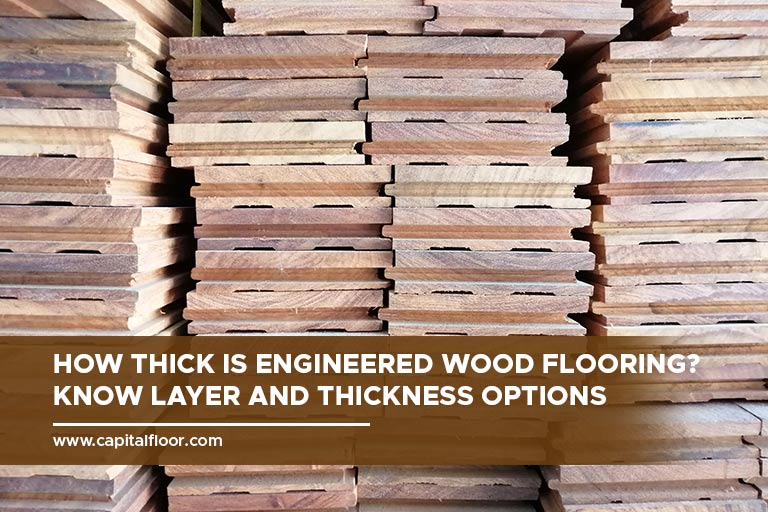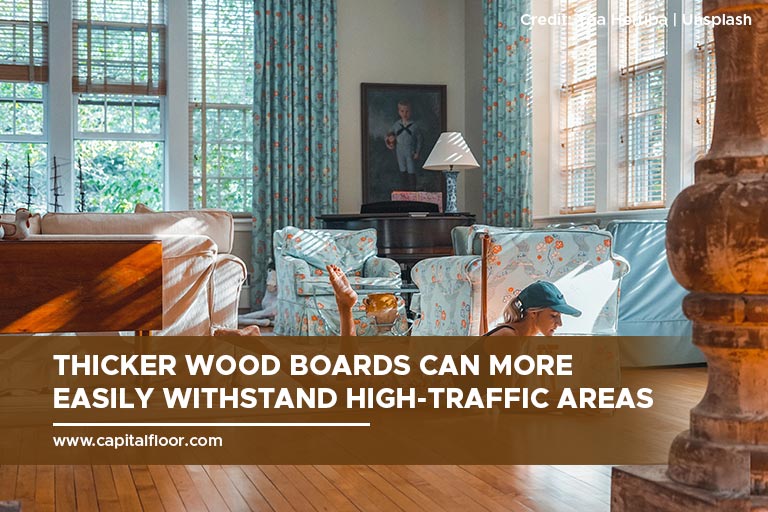Our showroom is open to the public. Please click HERE for more details.
Our showroom is open to the public. Please click HERE for more details.

You might be in the market for an engineered wood floor for your project for several reasons, including cost, ease of installation, and stability. While it is true that hardwood flooring looks great in any room and adds resale value to your home, it’s essential to choose the right thickness when replacing old flooring with engineered hardwood.
How thick is engineered wood flooring? To decide on the best thickness for your engineered wood flooring and ensure a seamless and long-lasting finish, here are some factors you must consider.
Before choosing the appropriate thickness of engineered wood flooring for your project, it is crucial to determine the level and composition of your subfloor. If the subfloor is uneven, a thicker board may be a better choice than a thinner one. Additionally, suppose you plan to set your boards directly on joists. In that case, opting for a board that is at least 18mm thick is recommended to ensure the necessary stability the joists provide.
A thinner plank allows for faster heat transfer. As a result, if you have underfloor heating or plan to install it, choosing a thinner plank is advisable. Still, following the manufacturer’s instructions for optimal results is crucial. Before placing engineered wood flooring over underfloor heating, consult with your flooring supplier and heating installer to ensure the proper installation.

Certain areas of a house tend to experience more wear and tear than others. For instance, passageways, kitchens, and living rooms often see more activity compared to bedrooms and dining rooms.
Opt for thicker boards for high-traffic areas. This is because the thickness of the laminate or solid wood top layer determines the number of times the floor can be sanded throughout its lifespan. Choosing a thicker board means a longer lifespan and easy long-term preservation of its aesthetic appeal.
For example, a 21/6-inch-thick engineered wood floor can typically be sanded up to 7 times during its lifespan, making it durable and cost-effective. On the other hand, a 15/4-inch-thick engineered wood floor has a surface layer that is 4mm thick and can be sanded up to 5 times during its lifetime.
Engineered wood flooring of good quality consists of multiple layers arranged in a cross pattern to ensure its strength and durability. When selecting the best thickness for engineered wood flooring, choosing a product with this framework is essential.
The wear layer, or top layer of the board, is always made of hardwood. However, some more affordable ranges may use multiple wood strips instead. If you want a board that has a more vintage feel, it is recommended to choose a ‘single strip’ wear layer made from a single piece of wood. It is also important to note that when comparing different boards, the thickness of the wear layer can vary.
The longevity of a board and how many times it can be sanded by hand depends on the thickness of its wear layer.
The under-core is a crucial consideration when buying engineered hardwood flooring as it affects the stability of the product. A multi-laminate hardwood ply is a hallmark of high-quality engineered wood, providing strength and stability due to its cross-layered composition. Inexpensive options may have a less stable “block board” under-core, which is cheaper but less sturdy. Considering the under-core when installing the boards in areas with underfloor heating or extreme temperature or humidity swings is important. Plywood boards are more stable than solid boards, as their cross-layered construction reduces expansion and contraction.
At Capital Hardwood Flooring, we understand that finding the right flooring for your home can be daunting. That’s why we’re here to help you every step of the way. A thicker wear layer is vital for durability, and we offer a wide range of options to fit your needs. Whether you’re looking for oak planks or engineered walnut flooring, we have something for everyone. Call us today at 416-536-2200, and let us help you find your perfect flooring match!